/*
C:\Users\ebata\yamaguchi\src_light
■このサンプルプログラムのキモ
(1)座標を入力して一番近いpostGISのノードIDを検知して、ダイクストラ計算を行うこと
(2)ユーザ心理を計算するファジィ推論を行うこと
が入っているプログラムである。
■自動計算を実施するバッチ、dummy.batの内容は以下の通り
go run light-sim.go data/mod_20220522holyday_visitor.csv data/new_20220522holyday_visitor.csv
go run light-sim.go data/mod_20220521holyday_visitor.csv data/new_20220521holyday_visitor.csv
go run light-sim.go data/mod_20220522holyday.csv data/new_20220522holyday.csv
go run light-sim.go data/mod_20220518weekday.csv data/new_20220518weekday.csv
■その入力用のcsvファイルの一つである、"data/mod_20220522holyday_visitor.csv"の内容は以下の通り
34.172891,131.456346,34.182418,131.474987,21
34.163801,131.444142,34.164454,131.449142,62
34.158856,131.435881,34.164727,131.431189,52
(中略)
34.146351,131.461154,34.167045,131.448468,20
34.145639,131.449237,34.149603,131.432828,29
■"data/bike_stations.csv"の中身
index,station,address,lat,lon,initial_stock,max_stock
1,null,null,34.102543,131.392639,20,20
2,null,null,34.102543,131.392639,20,20
3,null,null,34.102543,131.392639,20,20
4,山口県庁前バス停,山口市春日町2086-4,34.183621,131.471688,20,20
5,null,null,34.102543,131.392639,20,20
6,山口市役所 駐輪場,山口市亀山町2-1,34.178056,131.474204,20,20
7,一の坂川交通交流広場,山口市中河原7-1,34.17960577,131.4783006,20,20
8,null,null,34.102543,131.392639,20,20
9,コープやまぐちこことどうもん店 駐輪場,山口市道場門前1-1-18,34.174234,131.474885,20,20
10,山口駅 駐輪場,山口市惣太夫町288-9,34.172219,131.480013,20,20
11,山口市教育委員会 駐輪場,山口市中央5-14-22,34.170346,131.46915,20,20
12,null,null,34.102543,131.392639,20,20
13,ファミリーマート山口泉都町店,山口市泉都町9-2,34.167346,131.462048,20,20
14,防長苑,山口市熊野町4-29,34.167204,131.45973,20,20
15,null,null,34.102543,131.392639,20,20
16,ホテルニュータナカ,山口市湯田温泉2-6-24,34.163937,131.456115,20,20
17,null,null,34.102543,131.392639,20,20
18,湯田温泉駅 駐輪場,山口市今井町146-6,34.159954,131.459967,20,20
19,アルク平川店,山口市平井724-1,34.152742,131.464199,20,20
20,山口大学(正門),山口市吉田1677-1,34.149852,131.466214,20,20
21,小郡総合支所 駐輪場,山口市小郡下郷609番地1,34.102543,131.392639,20,20
22,KDDI維新ホール 駐輪場,山口市小郡令和1丁目1番地,34.09368,131.394,20,20
23,風の並木通り(新山口駅南口側),山口市小郡金町1-1付近,34.092322,131.397667,20,20
24,平成公園 駐車場内,山口市小郡平成町3-1,34.088168,131.401698,20,20
25,null,null,34.102543,131.392639,20,20
26,アルク小郡店,山口市小郡下郷2273番地1,34.097135,131.391295,20,20
27,null,null,34.102543,131.392639,20,20
*/
package main
import (
"database/sql"
"encoding/csv"
"fmt"
"log"
"os"
"strconv"
_ "github.com/lib/pq"
)
// 自転車の型
type BikeParam struct {
id int // 自転車の識別番号
destinationId int // 出発座標番号(*1)
arrivalId int // 到着座標番号
// (*1)
// 名前がdestination(目的地)となっているのは、バスがユーザを迎えに行き、載せた時点が「出発」扱いであった名残。
// 自転車の場合は迎えに行く動作が無いので、名称変更が望ましい。
}
// 座標情報
type LocInfo struct {
Lng float64 // 経度
Lat float64 // 緯度
Source int // 地図DBのID
}
// 自転車の拠点
type BikeStation struct {
location LocInfo // 拠点の位置
initialStock int // 最初に配置する自転車の台数
stationName string // 拠点の名称
}
// ステーションからの自転車の出入り
type StationStock struct {
outgoing int
incoming int
}
var stationstock [40]StationStock
const STATIONS_PATH string = "data/bike_stations.csv"
// 拠点情報を読み込み、BikeStation型の配列を返す
func getStationInfo(dbMap *sql.DB) []BikeStation {
// ファイルをオープン
csvFile, err := os.Open(STATIONS_PATH)
if err != nil {
log.Fatal(err)
}
defer csvFile.Close()
// CSVファイルの中身を読み込み
r := csv.NewReader(csvFile)
rows, err := r.ReadAll()
if err != nil {
log.Fatal(err)
}
stationInfo := []BikeStation{} // 出力変数
// 行ごとに
for i, row := range rows {
if i == 0 {
continue // CSVのヘッダー行を無視
}
lat, err := strconv.ParseFloat(row[3], 64)
if err != nil {
log.Fatal(err)
}
lng, err := strconv.ParseFloat(row[4], 64)
if err != nil {
log.Fatal(err)
}
initialStockVal, err := strconv.Atoi(row[5])
if err != nil {
log.Fatal(err)
}
stationNameVal := row[1]
// CSV読み込み時点の座標のログ(地図DBによって補正する前の座標)
//log.Println("csv read result:", lng, lat, initialStock)
// 地図DBを参照することによって、ステーションの位置をノードの位置にする
source, lngModified, latModified := fixPosition(dbMap, lng, lat)
loc := LocInfo{
Lng: lngModified,
Lat: latModified,
Source: source,
}
// 読み込めていることの確認ログ
//log.Println("Station", (i - 1), lngModified, latModified, initialStock, source)
bikeStation := BikeStation{
location: loc,
initialStock: initialStockVal,
stationName: stationNameVal,
}
stationInfo = append(stationInfo, bikeStation)
}
return stationInfo
}
// Scan用の仮変数
var source int
var longitude float64
var latitude float64
var dist float64
// 指定した座標に近いDB上の座標を取得
func fixPosition(db *sql.DB, _x1, _y1 float64) (int, float64, float64) {
upperLimitMeter := 1500.0 // 近傍ノードの上限を1500 mに設定
str := fmt.Sprintf(
// 修正前: ways (道) の中から最近傍を取得
// "SELECT source, x1 AS longitude, y1 AS latitude, ST_Distance('SRID=4326;POINT(%v %v)'::GEOGRAPHY, the_geom) AS dist FROM ways WHERE ST_DWithin(the_geom, ST_GeographyFromText('SRID=4326;POINT(%v %v)'), %.1f) ORDER BY dist LIMIT 1",
// 修正後: ways_vertices_pgr (点座標) の中から最近傍を取得
"SELECT id AS source, lon AS longitude, lat AS latitude, ST_Distance('SRID=4326;POINT(%v %v)'::GEOGRAPHY, the_geom) AS dist FROM ways_vertices_pgr WHERE ST_DWithin(the_geom, ST_GeographyFromText('SRID=4326;POINT(%v %v)'), %.1f) ORDER BY dist LIMIT 1",
_x1, _y1, _x1, _y1, upperLimitMeter,
)
//fmt.Println(str)
rows, err := db.Query(str)
if err != nil {
log.Fatal(err)
}
defer rows.Close()
foundGoodMapNode := false
for rows.Next() {
foundGoodMapNode = true
if err := rows.Scan(&source, &longitude, &latitude, &dist); err != nil {
fmt.Println(err)
}
//fmt.Println(source, longitude, latitude, dist)
}
if !foundGoodMapNode {
log.Println("Warning: in func fixPosition: Good Map Node not found for query point (",
_x1, ",", _y1, ")")
}
return source, longitude, latitude
}
/*
func getShortestDistanceToBikeStation(dbMap *sql.DB, node int) int {
StationId := -1
distance := 1000000.0
for i := 0; i < 2; i++ {
rowsDijkstra, errDijkstra := dbMap.Query(
"SELECT seq,source, target, x1, y1, x2, y2, agg_cost FROM pgr_dijkstra('SELECT gid as id, source, target, length_m as cost FROM ways', $1::bigint , $2::bigint , directed:=false) a INNER JOIN ways b ON (a.edge = b.gid) ORDER BY seq",
node,
Station[i].Node)
if errDijkstra != nil {
log.Fatal(errDijkstra)
}
defer rowsDijkstra.Close()
var agg_cost float64
for rowsDijkstra.Next() {
var x1, y1, x2, y2 float64
var seq, source, target int
err := rowsDijkstra.Scan(&seq, &source, &target, &x1, &y1, &x2, &y2, &agg_cost)
if err != nil {
fmt.Println(err)
}
}
if distance > agg_cost {
distance = agg_cost
StationId = i
}
}
return StationId
}
*/
// 江端修正版
func getDijkstraPath(dbMap *sql.DB, locInfoStart, locInfoGoal LocInfo) ([]LocInfo, float64) {
//log.Println("getDijkstraPath", locInfoStart, locInfoGoal)
var path []LocInfo // 経路 (返り値の一つ目)
var totalDistanceKm float64
rowsDijkstra, errDijkstra := dbMap.Query(
"SELECT seq,source, target, x1, y1, x2, y2, agg_cost FROM pgr_dijkstra('SELECT gid as id, source, target, length_m as cost FROM ways', $1::bigint , $2::bigint , directed:=false) a INNER JOIN ways b ON (a.edge = b.gid) ORDER BY seq",
locInfoStart.Source,
locInfoGoal.Source)
if errDijkstra != nil {
log.Fatal(errDijkstra)
}
defer rowsDijkstra.Close()
var agg_cost float64
isFirstCheck := true
isSourceCheck := true
for rowsDijkstra.Next() {
var x1, y1, x2, y2 float64
var seq int
var target int
// まずnodeを読む
if err := rowsDijkstra.Scan(&seq, &source, &target, &x1, &y1, &x2, &y2, &agg_cost); err != nil {
fmt.Println(err)
}
// 最初の1回だけ入る
if isFirstCheck {
if source == locInfoStart.Source {
isSourceCheck = true
} else {
isSourceCheck = false
}
isFirstCheck = false
}
var loc LocInfo
if isSourceCheck {
loc.Source = source
loc.Lng = x1
loc.Lat = y1
} else {
loc.Source = target
loc.Lng = x2
loc.Lat = y2
}
loc.Source = target
path = append(path, loc)
}
// ラストノードだけは手入力
path = append(path, locInfoGoal)
totalDistanceKm = agg_cost / 1000.0
return path, totalDistanceKm
}
// 一番近いステーションのIDを取得
func getNearestStation(dbMap *sql.DB, stationInfo []BikeStation, queryLocation LocInfo) (int, float64) {
bestDistanceKm := 1000.0 // 十分に大きい数
var bestStationId int
for i := 0; i < len(stationInfo); i++ {
// ダイクストラ法による経路で決定する距離
// SQLクエリを繰り返し実行するため、処理が遅くなる可能性がある
_, distKm := getDijkstraPath(dbMap, queryLocation, stationInfo[i].location)
// 直線距離の概算値(代替の計算方法)
//distKm, _ := distanceKm(queryLocation.Lng, queryLocation.Lat,
// stationInfo[i].location.Lng, stationInfo[i].location.Lat)
//log.Println("to station", i, "distanceKm=", distKm)
if distKm < bestDistanceKm {
bestDistanceKm = distKm
bestStationId = i
}
}
return bestStationId, bestDistanceKm
}
func main() {
dbMap, err := sql.Open("postgres",
"user=postgres password=password host=192.168.0.23 port=15432 dbname=yama_db sslmode=disable")
log.Println("------------------ map db open ------------------")
if err != nil {
log.Fatal("OpenError: ", err)
}
defer dbMap.Close()
// バイクステーション情報の読み込み
stationInfo := getStationInfo(dbMap)
//fmt.Println(stationInfo)
//file2, err2 := os.Open("data/new_20220518weekday.csv")
file2, err2 := os.Open(os.Args[1])
if err2 != nil {
log.Fatal(err2)
}
defer file2.Close()
r2 := csv.NewReader(file2)
rows2, err2 := r2.ReadAll() // csvを一度に全て読み込む
if err != nil {
log.Fatal(err2)
}
//file3, err3 := os.Create("data/calc2_new_20220518weekday.csv") // 第2パラメータ
file3, err3 := os.Create(os.Args[2]) // 第2パラメータ
if err3 != nil {
panic(err)
}
w := csv.NewWriter(file3)
output := []string{"id", "age", "origin_loc_Lng", "origin_loc_Lat", "dest_loc_Lng", "dest_loc_Lat", "distance_from_origin", "distance_between_stations", "distance_to_dest", "complain"}
if err = w.Write(output); err != nil {
log.Fatal(err)
}
for id, row := range rows2 {
/*
origin_lng := 131.4686813247102
origin_lat := 34.17901518198008
dest_lng := 131.45836175237153
dest_lat := 34.160484344205294
*/
origin_lng, err := strconv.ParseFloat(row[1], 64)
if err != nil {
log.Fatal(err)
}
origin_lat, err := strconv.ParseFloat(row[0], 64)
if err != nil {
log.Fatal(err)
}
dest_lng, err := strconv.ParseFloat(row[3], 64)
if err != nil {
log.Fatal(err)
}
dest_lat, err := strconv.ParseFloat(row[2], 64)
if err != nil {
log.Fatal(err)
}
age, err := strconv.ParseFloat(row[4], 64) // 年齢も実数扱いする
if err != nil {
log.Fatal(err)
}
// 最接近のステーションを選ぶ
var origin_loc, dest_loc LocInfo
origin_loc.Source, origin_loc.Lng, origin_loc.Lat = fixPosition(dbMap, origin_lng, origin_lat)
dest_loc.Source, dest_loc.Lng, dest_loc.Lat = fixPosition(dbMap, dest_lng, dest_lat)
stationId_from_origin, distance_from_origin := getNearestStation(dbMap, stationInfo, origin_loc) // Originから最初のステーション
stationId_to_dest, distance_to_dest := getNearestStation(dbMap, stationInfo, dest_loc) // 最後のステーションからDest
fmt.Println(stationInfo[stationId_from_origin])
stationstock[stationId_from_origin].outgoing++
fmt.Println(stationInfo[stationId_to_dest])
stationstock[stationId_to_dest].incoming++
_, distance_between_stations := getDijkstraPath(dbMap, stationInfo[stationId_from_origin].location, stationInfo[stationId_to_dest].location)
_, shortest_distance_total := getDijkstraPath(dbMap, origin_loc, dest_loc)
fmt.Println("stationId_from_origin, distance_from_origin", stationId_from_origin, distance_from_origin)
fmt.Println("stationId_to_dest, distance_to_dest", stationId_to_dest, distance_to_dest)
fmt.Println("distance_between_stations", distance_between_stations)
fmt.Println("shortest_distance_total", shortest_distance_total)
// 出発 ― _x[km]の歩行 ― 最初のステーション ― _y[km]の自転車走行 ― 最後のステーション ― _[km]の歩行 ― 到着
complain := fuzzy_reasoning(distance_from_origin, distance_between_stations, distance_to_dest, age)
fmt.Println("complain", complain)
output := []string{
fmt.Sprint(id),
fmt.Sprint(age),
fmt.Sprint(origin_loc.Lng),
fmt.Sprint(origin_loc.Lat),
fmt.Sprint(dest_loc.Lng),
fmt.Sprint(dest_loc.Lat),
fmt.Sprint(distance_from_origin),
fmt.Sprint(distance_between_stations),
fmt.Sprint(distance_to_dest),
fmt.Sprint(complain)}
fmt.Println(output)
if err = w.Write(output); err != nil {
log.Fatal(err)
}
}
// test
output = []string{"stationid", "outgoing", "incoming"}
if err = w.Write(output); err != nil {
log.Fatal(err)
}
for i := 0; i < 40; i++ {
output = []string{fmt.Sprint(i + 1), fmt.Sprint(stationstock[i].outgoing), fmt.Sprint(stationstock[i].incoming)}
// i+1しているのは、1からスタートする為
if err = w.Write(output); err != nil {
log.Fatal(err)
}
}
defer w.Flush()
if err := w.Error(); err != nil {
log.Fatal(err)
}
}
func fuzzy_reasoning(distance_from_origin, distance_between_stations, distance_to_dest, age float64) float64 {
////// パラメータの作成
// 絶対的歩行距離
walk := min_2(distance_from_origin, distance_to_dest)
// 総体的自転車移動距離
ratio := distance_between_stations / (distance_from_origin + distance_between_stations + distance_to_dest)
// 絶対的自転車移動距離
bike := distance_between_stations
// Age(前件部)
Age_Less := new_condition_MF3(45, 20, "LESS")
Age_Common := new_condition_MF3(45, 20, "COMMON") // 中央が 42歳
Age_More := new_condition_MF3(45, 20, "MORE")
// 絶対的歩行距離(前件部)
Walk_Less := new_condition_MF3(0.4, 0.1, "LESS")
Walk_Common := new_condition_MF3(0.4, 0.1, "COMMON")
Walk_More := new_condition_MF3(0.4, 0.1, "MORE")
// 相対的自転車移動比率(former)
Bike_Ratio_Less := new_condition_MF3(0.7, 0.1, "LESS")
Bike_Ratio_Common := new_condition_MF3(0.7, 0.1, "COMMON")
Bike_Ratio_More := new_condition_MF3(0.7, 0.1, "MORE")
// 絶対的自転車距離(前件部)
Bike_Less := new_condition_MF3(1.5, 1.0, "LESS")
Bike_Common := new_condition_MF3(1.5, 1.0, "COMMON")
Bike_More := new_condition_MF3(1.5, 1.0, "MORE")
// Complain(後件部)
Complain_LessLess := new_action_MF5(0.5, 0.25, "LESSLESS")
Complain_Less := new_action_MF5(0.5, 0.25, "LESS")
Complain_Common := new_action_MF5(0.5, 0.25, "COMMON")
Complain_More := new_action_MF5(0.5, 0.25, "MORE")
Complain_MoreMore := new_action_MF5(0.5, 0.25, "MOREMORE")
// [Rule A00]
Rule_A00 := min_2(Age_Less.func_X(age), Walk_Less.func_X(walk))
Complain_LessLess.func_Max(Rule_A00)
//fmt.Println("Rule_A00", Rule_A00)
// [Rule A01]
Rule_A01 := min_2(Age_Less.func_X(age), Walk_Common.func_X(walk))
Complain_Less.func_Max(Rule_A01)
//fmt.Println("Rule_A01", Rule_A01)
// [Rule A02]
Rule_A02 := min_2(Age_Less.func_X(age), Walk_More.func_X(walk))
Complain_Common.func_Max(Rule_A02)
//fmt.Println("Rule_A02", Rule_A02)
// [Rule A10]
Rule_A10 := min_2(Age_Common.func_X(age), Walk_Less.func_X(walk))
Complain_Common.func_Max(Rule_A10)
//fmt.Println("Rule_A10", Rule_A10)
// [Rule A11]
Rule_A11 := min_2(Age_Common.func_X(age), Walk_Common.func_X(walk))
Complain_Common.func_Max(Rule_A11)
//fmt.Println("Rule_A11", Rule_A11)
// [Rule A12]
Rule_A12 := min_2(Age_Common.func_X(age), Walk_More.func_X(walk))
Complain_More.func_Max(Rule_A12)
//fmt.Println("Rule_A12", Rule_A12)
// [Rule A20]
Rule_A20 := min_2(Age_More.func_X(age), Walk_Less.func_X(walk))
Complain_Common.func_Max(Rule_A20)
//fmt.Println("Rule_A20", Rule_A20)
// [Rule A21]
Rule_A21 := min_2(Age_More.func_X(age), Walk_Common.func_X(walk))
Complain_More.func_Max(Rule_A21)
//fmt.Println("Rule_A21", Rule_A21)
// [Rule A22]
Rule_A22 := min_2(Age_More.func_X(age), Walk_More.func_X(walk))
Complain_MoreMore.func_Max(Rule_A22)
//fmt.Println("Rule_A22", Rule_A22)
// [Rule B00]
Rule_B00 := Bike_Ratio_Less.func_X(ratio)
Complain_MoreMore.func_Max(Rule_B00)
//fmt.Println("Rule_B00", Rule_B00)
// [Rule B01]
Rule_B01 := Bike_Ratio_Common.func_X(ratio)
Complain_Common.func_Max(Rule_B01)
//fmt.Println("Rule_B01", Rule_B01)
// [Rule B02]
Rule_B02 := Bike_Ratio_More.func_X(ratio)
Complain_LessLess.func_Max(Rule_B02)
//fmt.Println("Rule_B02", Rule_B02)
// [Rule C00]
Rule_C00 := min_2(Age_Less.func_X(age), Bike_Less.func_X(bike))
Complain_LessLess.func_Max(Rule_C00)
//fmt.Println("Rule_C00", Rule_C00)
// [Rule C01]
Rule_C01 := min_2(Age_Less.func_X(age), Bike_Common.func_X(bike))
Complain_LessLess.func_Max(Rule_C01)
//fmt.Println("Rule_C01", Rule_C01)
// [Rule C02]
Rule_C02 := min_2(Age_Less.func_X(age), Bike_More.func_X(bike))
Complain_LessLess.func_Max(Rule_C02)
//fmt.Println("Rule_C02", Rule_C02)
// [Rule C10]
Rule_C10 := min_2(Age_Common.func_X(age), Bike_Less.func_X(bike))
Complain_Less.func_Max(Rule_C10)
//fmt.Println("Rule_C10", Rule_C10)
// [Rule C11]
Rule_C11 := min_2(Age_Common.func_X(age), Bike_Common.func_X(bike))
Complain_Common.func_Max(Rule_C11)
//fmt.Println("Rule_C11", Rule_C11)
// [Rule C12]
Rule_C12 := min_2(Age_Common.func_X(age), Bike_More.func_X(bike))
Complain_More.func_Max(Rule_C12)
//fmt.Println("Rule_C12", Rule_C12)
// [Rule C20]
Rule_C20 := min_2(Age_More.func_X(age), Bike_Less.func_X(bike))
Complain_Common.func_Max(Rule_C20)
//fmt.Println("Rule_C20", Rule_C20)
// [Rule C21]
Rule_C21 := min_2(Age_More.func_X(age), Bike_Common.func_X(bike))
Complain_More.func_Max(Rule_C21)
//fmt.Println("Rule_C21", Rule_C21)
// [Rule C22]
Rule_C22 := min_2(Age_More.func_X(age), Bike_More.func_X(bike))
Complain_MoreMore.func_Max(Rule_C22)
//fmt.Println("Rule_C22", Rule_C22)
// Reasoning calculations
numerator :=
Complain_LessLess.func_X()*Complain_LessLess.func_Y() +
Complain_Less.func_X()*Complain_Less.func_Y() +
Complain_Common.func_X()*Complain_Common.func_Y() +
Complain_More.func_X()*Complain_More.func_Y() +
Complain_MoreMore.func_X()*Complain_MoreMore.func_Y()
denominator :=
Complain_LessLess.func_Y() +
Complain_Less.func_Y() +
Complain_Common.func_Y() +
Complain_More.func_Y() +
Complain_MoreMore.func_Y()
reasoning := numerator / denominator
return reasoning
}
func max_2(a, b float64) float64 {
if a > b {
return a
} else {
return b
}
}
func min_2(a, b float64) float64 {
if a > b {
return b
} else {
return a
}
}
type condition_MF3 struct { // Base class for condition_MF3
center float64
width float64
express string
}
func new_condition_MF3(_center, _width float64, _express string) *condition_MF3 {
c3 := new(condition_MF3)
c3.center = _center
c3.width = _width
c3.express = _express
return c3
}
// Class for the membership function (3 mountains) of the former case
func (c3 *condition_MF3) func_X(_x float64) float64 {
// x,y denote coordinates on the membership function
x := _x
y := 0.0 // The value of y is always greater than or equal to 0 and less than or equal to 1
if c3.express == "LESS" {
if x <= c3.center-c3.width {
y = 1.0
} else if x <= c3.center {
y = -1.0 / c3.width * (x - c3.center)
} else {
y = 0.0
}
} else if c3.express == "COMMON" {
if x <= c3.center-c3.width {
y = 0.0
} else if x <= c3.center {
y = 1.0/c3.width*(x-c3.center) + 1.0
} else if x <= c3.center+c3.width {
y = -1.0/c3.width*(x-c3.center) + 1.0
} else {
y = 0.0
}
} else if c3.express == "MORE" {
if x <= c3.center {
y = 0.0
} else if x <= c3.center+c3.width {
y = 1.0 / c3.width * (x - c3.center)
} else {
y = 1.0
}
} else {
fmt.Println("MF3: wrong expression")
os.Exit(1)
}
return y
}
type condition_MF5 struct { // Base class for condition_MF5
center float64
width float64
express string
}
func new_condition_MF5(_center, _width float64, _express string) *condition_MF5 {
c5 := new(condition_MF5)
c5.center = _center
c5.width = _width
c5.express = _express
return c5
}
func (c5 *condition_MF5) func_X(_x float64) float64 {
// Class for the former membership function (5 mountains)
// x,y are the coordinates on the membership function
x := _x
y := 0.0 // The value of y is always greater than or equal to 0 and less than or equal to 1
if c5.express == "LESSLESS" {
if x <= c5.center-2.0*c5.width {
y = 1.0
} else if x <= c5.center-c5.width {
y = -1.0/c5.width*(x-(c5.center-2.0*c5.width)) + 1.0
} else {
y = 0.0
}
} else if c5.express == "LESS" {
if x <= c5.center-2.0*c5.width {
y = 0.0
} else if x <= c5.center-c5.width {
y = 1.0/c5.width*(x-(c5.center-c5.width)) + 1.0
} else if x <= c5.center {
y = -1.0/c5.width*(x-(c5.center-c5.width)) + 1.0
} else {
y = 0.0
}
} else if c5.express == "COMMON" {
if x <= c5.center-c5.width {
y = 0.0
} else if x <= c5.center {
y = 1.0/c5.width*(x-c5.center) + 1.0
} else if x <= c5.center+c5.width {
y = -1.0/c5.width*(x-c5.center) + 1.0
} else {
y = 0.0
}
} else if c5.express == "MORE" {
if x <= c5.center {
y = 0.0
} else if x <= c5.center+c5.width {
y = 1.0/c5.width*(x-(c5.center+c5.width)) + 1.0
} else if x <= c5.center+2.0*c5.width {
y = -1.0/c5.width*(x-(c5.center+c5.width)) + 1.0
} else {
y = 0.0
}
} else if c5.express == "MOREMORE" {
if x <= c5.center+c5.width {
y = 0.0
} else if x <= c5.center+2.0*c5.width {
y = 1.0/c5.width*(x-(c5.center+2.0*c5.width)) + 1.0
} else {
y = 1.0
}
} else {
fmt.Println("MF5 func_X(): wrong expression")
os.Exit(1)
}
return y
}
/////////////////////////////
type action_MF5 struct { // Base class for action_MF5
center float64
width float64
express string
x float64
y float64
}
type action_MF3 struct { // Base class for action_MF3
center float64
width float64
express string
x float64
y float64
}
func new_action_MF5(_center, _width float64, _express string) *action_MF5 {
a5 := new(action_MF5)
a5.center = _center
a5.width = _width
a5.express = _express
if a5.express == "LESSLESS" {
a5.x = a5.center - 2.0*a5.width
} else if a5.express == "LESS" {
a5.x = a5.center - a5.width
} else if a5.express == "COMMON" {
a5.x = a5.center
} else if a5.express == "MORE" {
a5.x = a5.center + a5.width
} else if a5.express == "MOREMORE" {
a5.x = a5.center + 2.0*a5.width
} else {
fmt.Println("new_action_MF5: wrong scale expression")
os.Exit(-1)
}
a5.y = 0.0
return a5
}
func new_action_MF3(_center, _width float64, _express string) *action_MF3 {
a3 := new(action_MF3)
a3.center = _center
a3.width = _width
a3.express = _express
if a3.express == "LESS" {
a3.x = a3.center - a3.width
} else if a3.express == "COMMON" {
a3.x = a3.center
} else if a3.express == "MORE" {
a3.x = a3.center + a3.width
} else {
fmt.Println("new_action_MF3: wrong scale expression")
os.Exit(-1)
}
a3.y = 0.0
return a3
}
// The latter membership function (5 mountains) class
func (a5 *action_MF5) func_Y() float64 {
return a5.y
}
// The latter membership function (3 mountains) class
func (a3 *action_MF3) func_Y() float64 {
return a3.y
}
func (a5 *action_MF5) func_Max(b float64) {
a5.y = max_2(b, a5.y)
}
func (a3 *action_MF3) func_Max(b float64) {
a3.y = max_2(b, a3.y)
}
func (a5 *action_MF5) func_X() float64 {
return a5.x
}
func (a3 *action_MF3) func_X() float64 {
return a3.x
}座標を入力して一番近いpostGISのノードIDを検知して、ダイクストラ計算を行い、ユーザ心理を計算するファジィ推論を行うサンプルプログラム
「無償の愛」を『無期限』とする計画は、必ず破綻します ―― "必ず"です。
『6ヶ月』 ―― これが、私が計算と経験則から導き出した結論です。
Six months" is the conclusion I have drawn from my calculations and rule of thumb.
【新着記事】「江バ電」で人身事故をシミュレーションしてみた https://t.co/Qxr14X4COB pic.twitter.com/oJlAOsppaG
— EE Times Japan編集部 (@eetimes_jp) June 29, 2016
上記の私のコラムの5ページ目に、以下の記載があります。
You will find the following statement on page 5 of my column above.
■「この私」が、3・11の震災(東日本大震災)をどのように忘れていったのかを、定量的に知りたいと思いました。
- I wanted to know quantitatively how "this I" had forgotten about the 3/11 disaster (the Great East Japan)
■そこで、私がここ何年間、1日も欠かさずに記録し続けているブログを使って、以下のような調査をやってみました。
- I did the following survey using my blog, which I have kept track of without missing a single day for the past years.
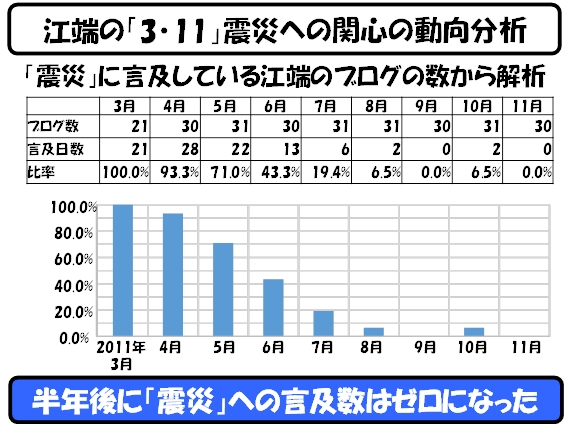
-----
高齢者介護 ~医療の進歩の代償なのかhttps://t.co/R1DV5OshVJ pic.twitter.com/IiQbaWM0tR
— EE Times Japan編集部 (@eetimes_jp) July 30, 2018
上記の私のコラムの6ページ目に、以下の記載があります。
You will find the following statement on page 6 of my column above.
■ここから導かれる一つの仮説は、江戸時代以前の"寝たきり"とは、どんなに長くても半年程度であったということです。
- One hypothesis derived from this is that "bedridden" was only for about six months before the Edo period.
■当時の介護技術で、"寝たきり"を3年とか10年のオーダーで成立させるのは、無理だったはずです。
- With the care technology available at the time, it would have been impossible to keep a person "bedridden" for three or ten years.
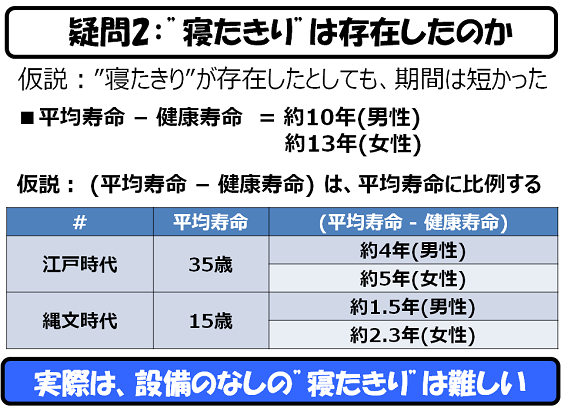
-----
ウクライナ支援についても、各国の「支援疲れ」は、厳然たる事実です。
As for support for Ukraine, it is a stark fact that countries are "tired of supporting" Ukraine.
期限が定められていない支援に耐えられるほど、私たちは強くないのです。
We are not strong enough to withstand support without a set deadline.
-----
結論:
Conclusion:
(1)「他人への、条件のない愛情(無償の愛)のストックには上限がある」
(1) "There is an upper limit to the stock of unconditional love (free love) for others."
(2)「そのストックは、概ね6ヶ月で尽きる」
(2) "Its stock generally runs out in six months."
(3)「被災地支援、寝たきりの人への介護が「無償」で継続できる期間は、最長で"半年"である」
(3) "The maximum period during which support for disaster-affected areas and care for bedridden people can continue "free of charge" is "six months.
この現実をベースに、私たちは、被災者支援や高齢者介護を計画しなければならないと思います。
Based on this reality, we must plan to support the affected population and care for older people.
「無償の愛」を『無期限』とする計画は、必ず破綻します ―― "必ず"です。
The plan to make "free love" "indefinite" will surely fail -- "surely."
『東アジア反日武装戦線の桐島聡を確保』 ―― このニュースを聞いた時に、私は、本当に驚きました。
『東アジア反日武装戦線の桐島聡を確保』 ―― このニュースを聞いた時に、私は、本当に驚きました。
"Satoshi Kirishima of the East Asian Anti-Japanese Armed Front secured" -- When I heard this news, I was shocked.
日本人であれば誰でも知っている顔です(交番の前に、必ず写真が貼ってあったはずです)。
Any Japanese person would recognize his face (you could always find a picture of it posted in front of the police box).
彼は、連続企業爆破事件のテロの主犯です。
He is the leading terrorist responsible for a series of business bombings.
といっても、私の知識も書物程度です。
However, my knowledge is also limited to books.
何しろ爆破事件があった時、私、小学生でしたから。
After all, I was in elementary school when the bombing occurred.
-----
私が、"中革"、"革マル"の大手2大スーパーマーケットのような過激派(今や後継者不足で、経営難ですが)の、次に私の頭に思い浮ぶ過激派が「東アジア反日武装戦線」です。
The next extremist group that comes to my mind after the two major supermarkets of "Chu-Kaku" and "Kanmaru" (now in financial difficulties due to lack of successors) is the "East Asian Anti-Japanese Armed Front."
(ちなみに『革命を否定していない(暴力革命は否定?)』という点では、最大大手スーパーは「日本共産党」です)
(Incidentally, the largest supermarket in terms of "not denying revolution (denying violent revolution?)" is the "Japanese Communist Party. )
それはさておき。
Aside from that.
-----
このニュースを聞いた時、
When I heard this news,
―― 日本の警察って、スゲーなぁ
"Japanese police are amazing!"
と感心したのですが、警察の捜査と関係のないところで、本人が明らかになったようです。
I was impressed, but it seems that the person himself was revealed in a way unrelated to the police investigation.
末期がんになった本人が、自ら本名を自白したとのことです。
He, who had terminal cancer, seemed to confess his real name to us himself.
なんか、私、昨日から、モヤモヤ感が拭えません。
For some reason, I have not been able to shake the feeling of bewilderment since yesterday.
- 最期に全てを自白して果てるとは、良い覚悟だ
- It's an excellent resolution to confess everything at the end.
- 最期になってから全てを自白するとは、情けない野郎だ
- He's a pathetic son of a bitch, confessing everything at the last minute.
- 革命戦士としての矜持があるなら、無名の戦士として消えていくべきだ
- If he is proud to be a revolutionary warrior, he should have disappeared as an unknown warrior.
- 革命戦士としての総括するのであれば、残りの力を振り絞って、事件の全容を語り尽くせ
- If he is going to sum up as a revolutionary warrior, then use all his remaining strength to tell the whole story of the incident.
と、なんか、この爆弾テロリスト(多分、テロリストとして"確定"で良いと思う)を、どう評価して良いのか分からず、昨日から揺れております。
I have been annoyed since yesterday, not knowing how to evaluate this terrorist bombing (I think it is probably "confirmed" that he is a terrorist).
-----
京アニ放火殺人事件の青葉被告に死刑判決(但し一審判決で、現在控訴中)が出たタイミングで、桐島聡の身柄のニュースです。
The news of Satoshi Kirishima's custody comes at a time when the defendant Aoba in the Kyo-Ani arson and murder case has been sentenced to death (but only at the first trial and is currently on appeal).
1974年の三菱重工本社ビル爆破事件では、8人が殺害され、108人が重軽傷を負いました。
The 1974 bombing of the Mitsubishi Heavy Industries headquarters building killed eight people and seriously injured 108 others.
テロ事件という意味では、この2つは、同じカテゴリーと考えて良いと思います。
Regarding terrorist incidents, the two can be considered in the same category.
-----
末期ガンであろうがなんであろうが、なんか彼を生かせ続けて、あの事件(連続企業爆破事件)を本人がどのように総括するのかを、私は、彼の口から聞きたいのです ――
I would like to hear from him how he would sum up that incident (the serial business bombings) by keeping him alive, terminal cancer or not.
何が何でも。
Whatever it takes.
「地元いじり」をして貰えるというのは、なんというか"嬉しい"ものです。
映画「翔んで埼玉」は、2作目もヒットしたとの話を聞いております。
I have heard that the second movie "Sho de Saitama" was also a hit.
「翔んで埼玉」は、楽しい映画ではありましたが、私は『爆笑して卒倒する』という程ではありませんでした(まあ、そんな映画、滅多にありませんが)。
Sho de Saitama" was an enjoyable movie, but not so much that I "burst out laughing and swooned" (well, such movies are rare).
-----
昨日、YouTubeで見た、中川家さんの『中川家の寄席2022「東京で賃貸物件探し」』の方にヒットしました(YouTubeに飛びます)。
Yesterday, I was hit by "The Nakagawa Yosei 2022 "Finding a Property for Rent in Tokyo" by the Nakagawa, which I watched on YouTube (jump to YouTube).
"小田急沿線"、"下北沢いじり"、"新百合ヶ丘越え"、"南武線"という、私に馴染みの路線に加えて、
In addition to the Odakyu line, Shimokitazawa, Shinyurigaoka, and Nambu line, which I am familiar with,
(正直大阪は良く分からかったのですが)"梅田"、"京都"、"大津"は、大学時代の私のテリトリーでしたので、
(To be honest, I didn't know much about Osaka.) "Umeda," "Kyoto," and "Otsu" were my territory when I was in college,
―― 笑いました。
-- I laughed.
家族にもLineを送りました。
I also sent a Line to my family.

-----
このコントに登場する、(1)大阪(京都を含む)と(2)東京(の西側)は、私の過去と現在のテリトリーでした。
(1) Osaka (including Kyoto) and (2) the west side of Tokyo (the west side of Tokyo), which appear in this contrast, were my past and present territories.
「地元いじり」をして貰えるというのは、なんというか"嬉しい"ものです。
It is a pleasure to have someone "tinker" with the local community.
地味な地元に、スポットライトを当てて貰えるような感じです。
It is like having a spotlight shined on a humble local community.
「翔んで埼玉」が埼玉県の人に大ヒットしたというのは、至極当然のことでしょう。
It is quite natural that "Sho de Saitama" was a big hit with the people of Saitama Prefecture.
ただ、これは、いわゆる「身内ウケ」のようなもので、マスマーケティング的には美味しくなさそうな気がします。
However, I feel that this is what is called "private favour" and does not seem to be tasty from a mass marketing perspective.
-----
ちなみに、私は名古屋(の隣の市)の出身でもありますので、TVアニメ「八十亀ちゃんかんさつにっき」も笑えます。
By the way, I am also from Nagoya (the city next door), so I can also laugh at the TV anime "Yajukame-chan kansatsu nikki".
『地元ネタで笑える』ということが『地元を愛している』と同義かと問われると、ちょっと違和感を感じますが ――
I'm not sure if "laughing at local stories" is synonymous with "loving your hometown," though,
『愛』に近い"何か"があるんだろうな、とは思っています。
I think there is something similar to "love.
宿題
このコードが上手く起動できていない。
fastapi6/main.pyを参照のこと
import asyncio
from fastapi import FastAPI
app = FastAPI()
async def print_hello():
while True:
print("Hello")
await asyncio.sleep(60) # 60秒待機
@app.get("/aisatu")
async def get_aisatu():
return {"message": "konnichiwa"}
if __name__ == "__main__":
loop = asyncio.get_event_loop()
loop.create_task(print_hello()) # "Hello"出力プログラムを非同期タスクとして実行
import uvicorn
uvicorn.run(app, host="0.0.0.0", port=8000)
fastapiサーバを2段に非同期に連携させるテストプログラム
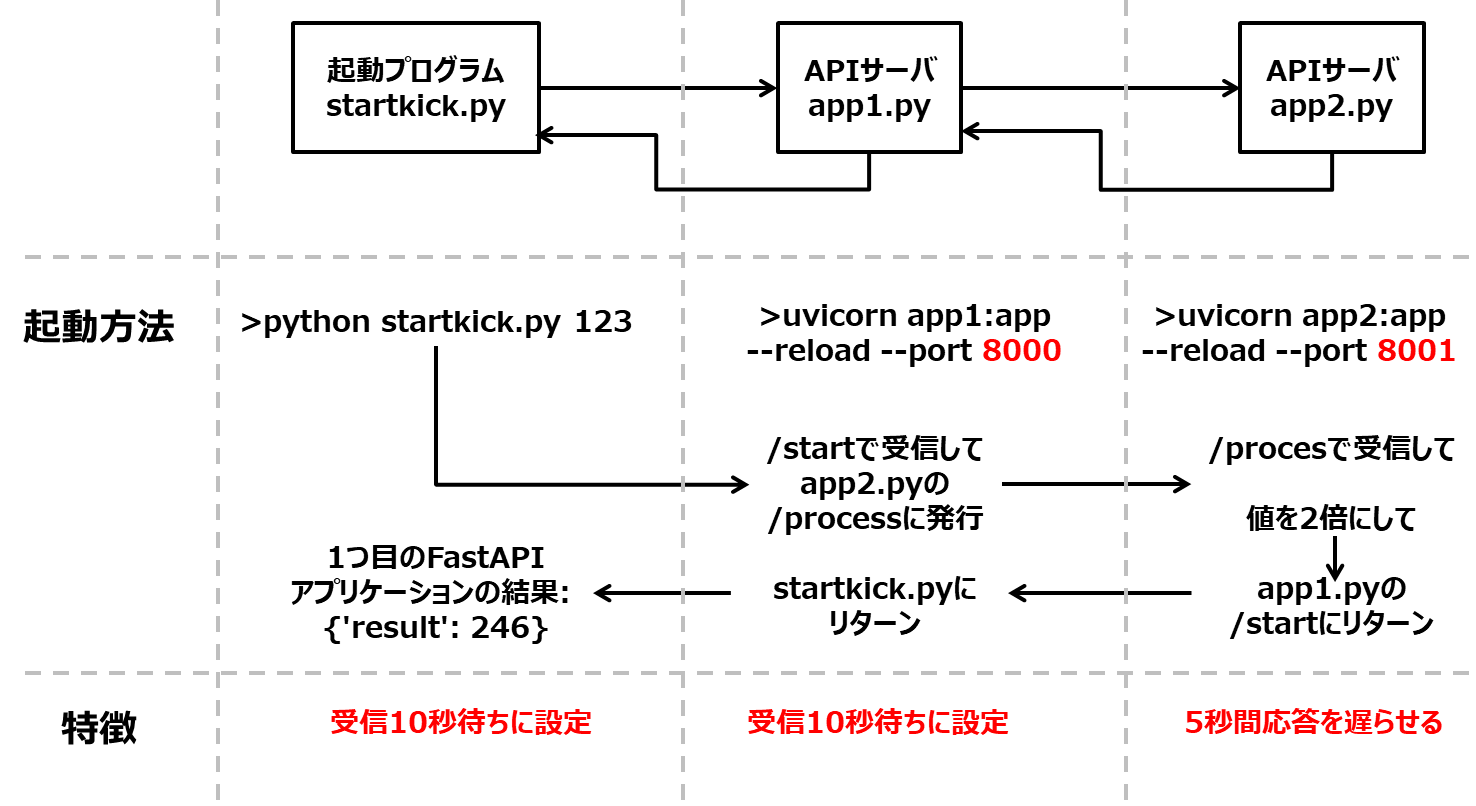
■startkick.py
import httpx
import sys
import asyncio
async def call_start_endpoint(value: int):
url = "http://localhost:8000/start" # 1つ目のFastAPIアプリケーションのエンドポイントURLを指定
input_data = {"value": value}
async with httpx.AsyncClient() as client:
#response = await client.post(url, json=input_data)
response = await client.post(url, json=input_data, timeout=10.0) #10秒間応答を待つ
if response.status_code == 200:
data = response.json()
return data
else:
print(f"エラーが発生しました。ステータスコード: {response.status_code}")
return None
if __name__ == "__main__":
if len(sys.argv) != 2:
print("使用法: python startkick.py <数値>")
sys.exit(1)
try:
value_to_send = int(sys.argv[1]) # コマンドライン引数から数値を取得
except ValueError:
print("数値を指定してください。")
sys.exit(1)
result = asyncio.run(call_start_endpoint(value_to_send))
if result:
print(f"1つ目のFastAPIアプリケーションの結果: {result}")■app1.py
from fastapi import FastAPI
import httpx
from pydantic import BaseModel
app = FastAPI()
class InputData(BaseModel): # json形式の場合これが必要。これが無いと422エラーで弾かれる
value: int
@app.post("/start")
#async def start(value: int): # json形式を無視した場合
async def start(input_data: InputData):
# 2つ目のFastAPIアプリケーションのprocessエンドポイントを呼び出す
url = "http://localhost:8001/process" # 2つ目のアプリケーションのエンドポイントURLを指定
value2 = input_data.value
input_data2 = {"value": value2}
async with httpx.AsyncClient() as client:
response = await client.post(url, json=input_data2, timeout=10.0) #10秒間応答を待つ
if response.status_code == 200:
data = response.json()
return data
else:
return {"error": f"エラーが発生しました。ステータスコード: {response.status_code}"}■app2.py
from fastapi import FastAPI
from pydantic import BaseModel
import asyncio
app = FastAPI()
class InputData(BaseModel):
value: int
class OutputData(BaseModel):
result: int
@app.post("/process")
async def process(input_data: InputData):
value = input_data.value
# 5秒間の待機
await asyncio.sleep(5)
# ここで2つ目のFastAPIアプリケーション独自の処理を行う(例: valueを2倍にする)
result = value * 2
return {"result": result}
別のjsonのメッセージを送信して、それの受信が返ってこないと、APIが終了しません(デッドロックしてしまう)。この問題を解決するfastapiの簡単なプログラムを作成して下さい
■fastapi側プログラム dummy2.py
from fastapi import FastAPI
from pydantic import BaseModel
import asyncio # asyncio モジュールをインポート
app = FastAPI()
class InputMessage(BaseModel):
value: int
class OutputMessage(BaseModel):
response: int # 数値を含むレスポンスメッセージ
@app.post("/process")
async def process(input_message: InputMessage):
# 5秒間の待機
await asyncio.sleep(5)
# サーバー側で数値を受け取り、同じ数値を含むレスポンスメッセージを返す
response_value = input_message.value
output_message = OutputMessage(response=response_value)
return output_message起動方法は、
uvicorn dummy2:app --host 0.0.0.0 --reload
■メッセージ送信側(クライアント)プログラム dummy3.py
import httpx
import sys
import asyncio # asyncio モジュールをインポート
async def send_message_to_api(value: int):
url = "http://localhost:8000/process" # FastAPIサーバーのエンドポイントURLを指定
input_message = {"value": value} # 送信する数値をJSONメッセージに含める
async with httpx.AsyncClient() as client:
response = await client.post(url, json=input_message, timeout=10.0)
if response.status_code == 200:
data = response.json()
print(f"APIからのレスポンス: {data['response']}")
else:
print(f"エラーが発生しました。ステータスコード: {response.status_code}")
if __name__ == "__main__":
if len(sys.argv) != 2:
print("使用法: python send.py <数値>")
sys.exit(1)
try:
value_to_send = int(sys.argv[1]) # コマンドライン引数から数値を取得
except ValueError:
print("数値を指定してください。")
sys.exit(1)
asyncio.run(send_message_to_api(value_to_send))起動方法は、
>python dummy3.py 10
平行に3つ起動しても、正確に非同期処理してくれるようです。
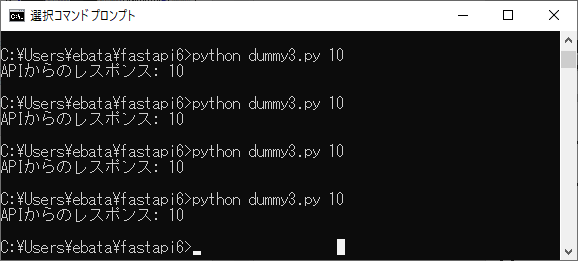
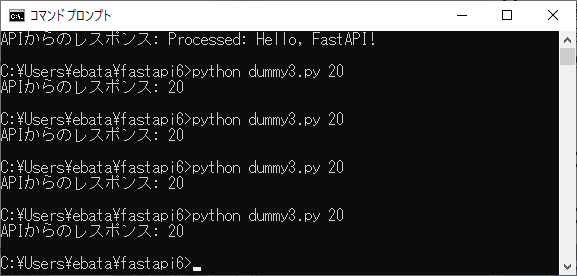
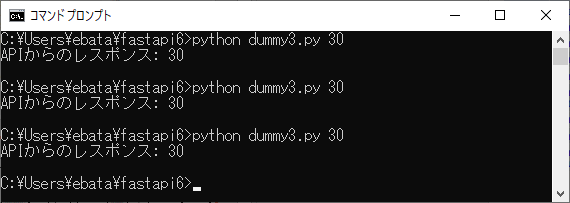
昨夜から、デッドロック問題で、困っていたので、原点に戻って考え中です。
今の私が探しているのは、『このビッグネームの芸人さんについて、今年の運勢について語っていた占い師または占い番組』です。
今、ビッグネームの芸人さんが、性加害の疑いをかけられて、芸能活動を停止されています。
Now, a big-name comedian has been suspended from performing due to allegations of sexual assault.
今の私は、その"真偽"に至る確証がありませんので、これについては言及しません。
I have no proof of the "truth" of this, " so I will not mention it.
今の私が探しているのは、
What I am looking for now,
―― このビッグネームの芸人さんについて、今年の運勢について語っていた占い師または占い番組
-- Fortune tellers or fortune-telling shows that talked about this big-name comedian and his fortune for this year.
です。
彼らは、
(1)「芸能活動の停止」という大事件を、ちゃんと予測していたのか?
(1) Did they properly predict the big event of "suspension of entertainment activities"?
(2)予測した上で、その対策をちゃんとサジェスチョン(提案)していたのか?
(2) Did they predict the above (1) and make suggestions for countermeasures?
上記(2)は難しいと思うのですが、上記(1)ができていなかったのであれば、その「占い師」は、"無能"または"嘘吐き"と言わないまでも、"無用"であるとは言えると思います。
I think (2) above is brutal, but if (1) above was not done, then the "fortune teller" is "useless," if not "incompetent" or "a liar.
そのようやスキャンダルの予防措置への警告も出せないような「占い師」や「占い番組」は結局のところ"無用"、もっと言えば"害悪"にさえなると思うのですが ―― 多くの人は、そう考えないのでしょうか?
I think that "fortune-tellers" and "fortune-telling shows" that fail to warn against such scandalous precautions are ultimately "useless" or even "harmful" -- don't most people think so?
-----
ちなみに、私がシミュレーションでやっていることは「計算」です。現在のやっていることを、1mmも変えることなく、このまま続けていくとどうなるかを見極める、単純な計算です。
By the way, I am doing a " calculation " in the simulation." It is a simple calculation to determine what will happen if we continue what we currently do without changing a single millimeter.
『毎月10万円の収入があって、毎月12万円の支出をしていれば、1年後にいくらの赤字になる?』(答え:24万円の赤字)ということです。
'If you have an income of 100,000 yen per month and spend 120,000 yen per month, how much of a deficit will you have after one year?' (Answer: 240,000 yen deficit). Those are what I did.
ですから、根拠のロジックもデータも示さず、個人の主観だけを一方的に語る『占い』ごときと、私のシミュレーションの計算を、一緒に扱われるのことは非常に不本意です。
Therefore, it is miserable that my simulation calculations are treated with "fortune-telling," a one-way subjective statement by an individual without any logic or data to support it.
-----
ともあれ、私は「この芸人さんについて、今年の運勢について語っていた昨年占い番組またはその占い師」を探しています。
Anyway, I am looking for "last year's fortune-telling show or its fortune-teller who talked about this comedian and his fortune for this year."
本調査にご協力頂けましたら、幸いです(メールアドレスはこちら)。
We would appreciate your cooperation in this survey (e-mail address here).
それでも、私の父は、この私(江端)から、最大級の尊敬を勝ち得た大人の一人です。
私の父は、太平洋戦争中に予科練に入って敗戦を迎えましたので、最終学歴は中学校卒業(中卒)になると思います。
My father entered the Preparatory Training Course during the Pacific War and lost the war, so his final educational background is a junior high school graduate (middle school graduate).
父は、家族の為に働き続け、会社を解雇された後は、自力で工場を立ち上げました。
My father continued to work for the family, and after being laid off from the company, he set up his factory.
ただ、子どもの私の目から見ても、父には、優れた能力や、人を魅了する能力がなく、そして、運にも恵まれていなかった ―― ぶっちゃけ「絶無」だったと思います。
However, from my child's point of view, my father could not excel or attract others, and he was not blessed with luck -- to be frank, he was "nothing" at all.
それでも、私の父は、この私(江端)から、最大級の尊敬を勝ち得た大人の一人です。
Still, he was one of the adults who has won my utmost respect (Ebata) here.
-----
私は『学歴や能力や運で、自分の不運を嘆く人』に同情する気持ちが、湧いてきません。
I can't bring myself to feel sympathy for 'those who bemoan their bad luck based on their education, ability or luck.'
父を見てきたからです。
Because I have watched my father's back.
『あんたは、うちの親父よりも、恵まれていなかった、と言い切ることができるのか?』と ―― まあ、これは、理不尽な問いかけであることを百も承知の上で ―― 私は、尋ねたくなるのです。
"How can you say you were less fortunate than my father?" I am tempted to ask -- well, I know this is an unreasonable question.
上記のロジックは、以下の話と似ているような気がするかもしれませんが、
The above logic may sound similar to the following story. However,
全く、違います。
Not at all.
つまり「基礎的な知識の習得をサボり、敬語も使えんような奴は、『AI以下』」ということです。
ChatGPTなどのような、生成AIビジネスの成功(?)を見ていると、少なくとも一つ、言えることがあります。
The success(?) of generative AI businesses, such as ChatGPT, etc. There is at least one thing that can be said about the success of these businesses.
―― 詰め込み教育や礼儀教育は、正しいアプローチである
"Cramming and courtesy education are the right approach."
ということです。
生成AI技術の『製作』と、生成AI技術の『利用』には、全く関係ははありません(ここは大切なことなので、前もって言っておきますね)。
There is no relationship between the "production" of generative AI technology and the "use" of generative AI technology (this is important, so let me say it upfront).
しかし、生成AI技術の『製作』のプロセスを学ぶと、
However, when we learn the " production " process of generative AI technology, we can see that.
■『ChatGPTのような、親切な対応で、的確な解答をする』ような振舞いができる人間になる為には、
"To become a human being who can give accurate answers in a friendly manner like ChatGPT,"
■膨大な知識の「つめこみ」と、親切で丁寧な対応を行う「訓練」をしなければならない』
we need to "cram" a tremendous amount of knowledge and "train" ourselves to respond in a friendly and polite manner."
ということが良く分かります。
Please read this page for more information about that.
また、「親切で丁寧な対応」については、こちらの図をご覧下さい。
Also, please refer to this figure for "kind and courteous."
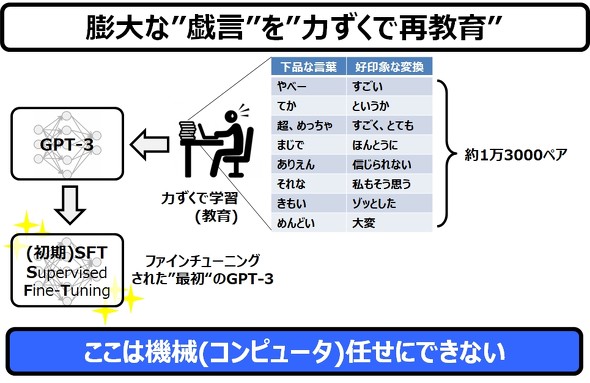
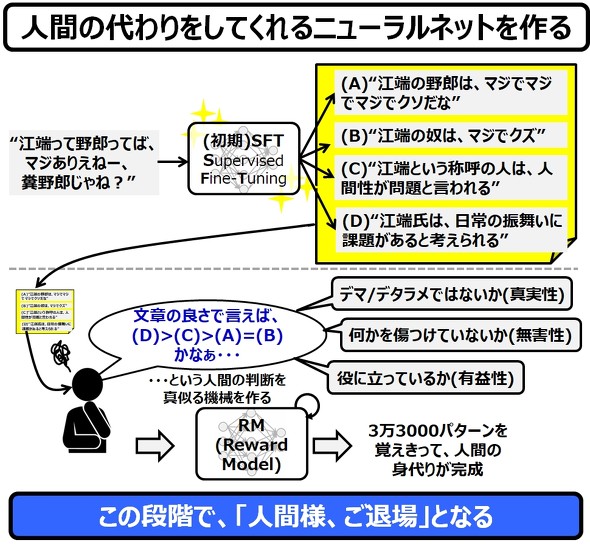
つまり「基礎的な知識の習得をサボり、敬語も使えんような奴は、『AI以下』」ということです。
In other words, "those who skip learning essential knowledge and cannot even use honorifics are 'less than AI.
-----
ティーンエイジャやその保護者の「つめこみ教育で、思考力や想像力低下する」だのの主張は、私の知っている限り妄言です。
As far as I know, the claims of teenagers and their parents that "cramming education reduces thinking and imagination" are delusional.
思考力や想像力というのは、既存の思考方法や現存する手法に、少しづつ「上乗せ」しながら創成されるものだからです。
This is because the power of thought and imagination is created by "adding on" little by little to existing thinking methods and processes.
つまり、『ベースとなる知識なしに、それを超えるような思考や想像が出せるわけなかろうが』というのが私の見解です。
In other words, I believe 'without base knowledge, there is no way to think or imagine beyond it.
「私」とは『王禅寺の特許明細書製造装置・江端』のことです。
I am "Ozenji's Patent Specification Manufacturing Equipment, Ebata.